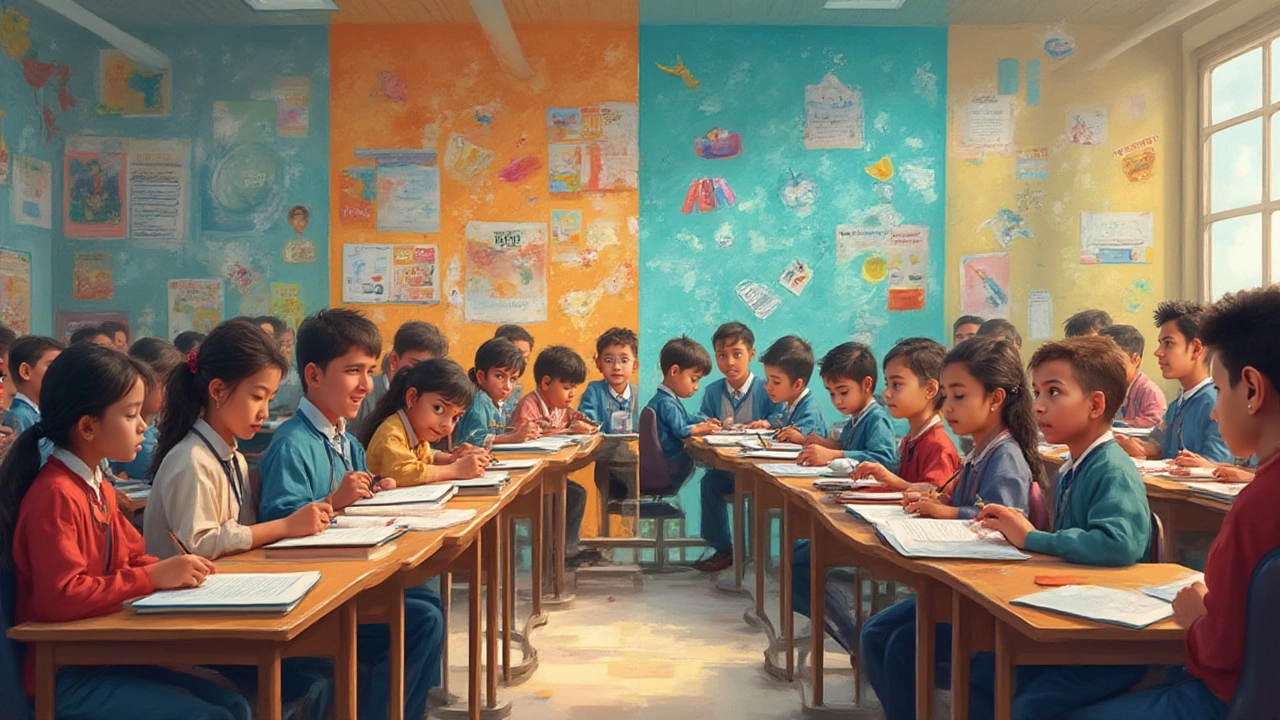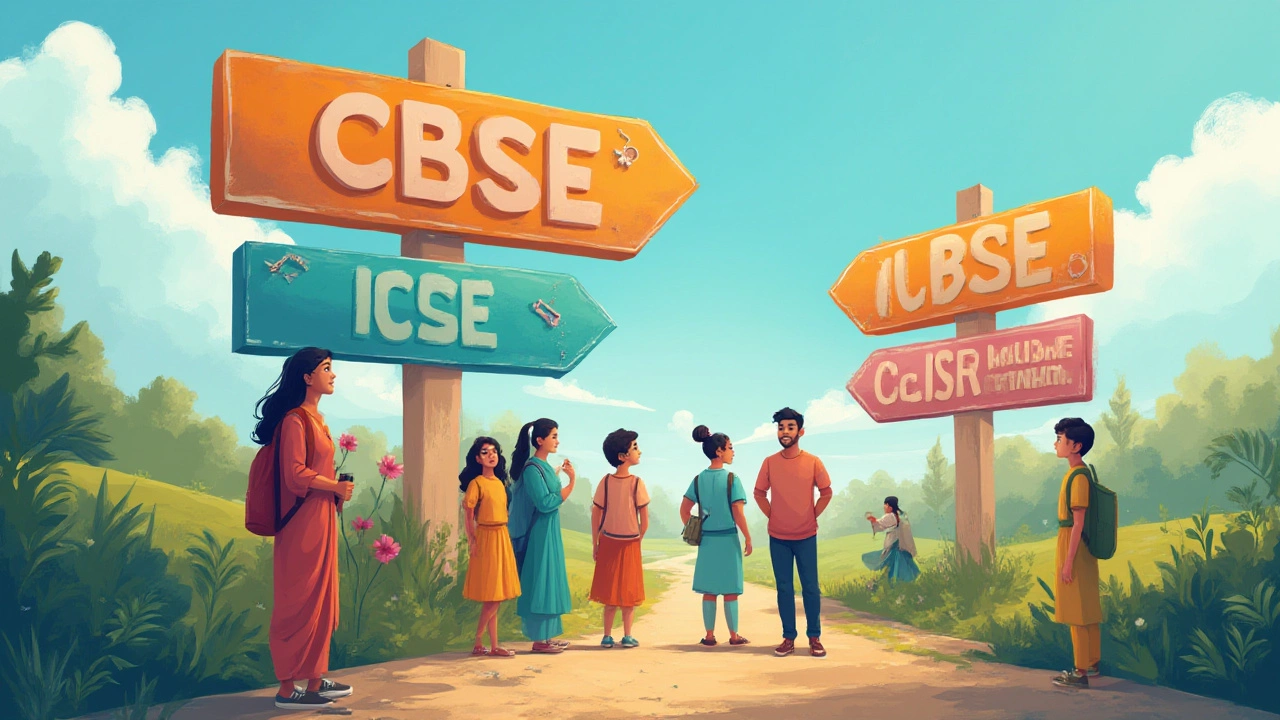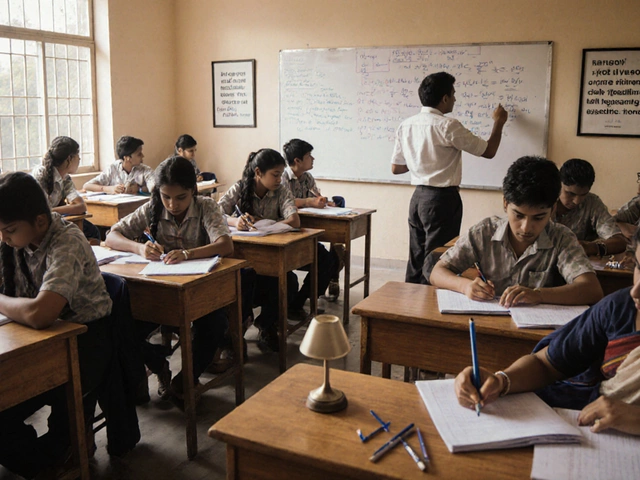Jul
28

- by Dhruv Ainsley
- 0 Comments
It's funny how a decision you make before even turning sixteen can shape so much of your future. School boards might sound like something that belongs in a row of dull PowerPoint slides, but parents lose sleep over this choice, students debate it in WhatsApp groups, and every year new facts come tumbling out in family discussions. The board you pick isn't just a piece of paper. It influences how you think, where you apply for college, and even the way you approach challenges later on. So, which education board is really best for shaping your future?
How Different Education Boards Shape Students
India offers four main education boards: State Boards, CBSE, ICSE, and IB. Each has its own way of doing things, from what you study to how you’re examined. The Central Board of Secondary Education (CBSE) is probably the most recognized and is followed by more than 27,000 schools, not just in India but also in 28 countries. Why is it so popular? It focuses on a standardized syllabus shaped with competitive exams like JEE and NEET in mind. That means if your sights are set on engineering or medicine, the CBSE syllabus lowers your learning curve.
ICSE (Indian Certificate of Secondary Education), managed by CISCE, is usually in the same league as CBSE but often seen as slightly more challenging due to the emphasis on literature, language, and creative writing. Students here spend more time on projects and theory, making them more comfortable with in-depth concepts and extended essays. ICSE schools number around 2,300—far fewer than CBSE, but good ICSE schools boast a reputation for strong English language skills.
IB (International Baccalaureate) is all about the big picture, focusing on research, analysis, and a global outlook. While only about 205 schools in India offer it, IB students get to write a 4,000-word essay before finishing school. That’s almost university-level stuff. The curriculum is rooted in inquiry and real-world connection, preparing students for international universities. But the catch: IB is usually found in bigger cities and is more expensive.
State Boards vary wildly. Andhra Pradesh’s board is nothing like Maharashtra’s. Some are updated, offer flexibility, and accept local languages as exam mediums, which can be a big plus for some families. However, critics often point out the lack of uniformity, outdated syllabi in some states, and difficulty in transition if you switch states.
Choosing a board shapes more than just academics. CBSE molds for competitive exams. ICSE gives you strong language skills. IB unlocks the world. State Boards make things familiar and can reduce pressure with familiarity in language and pattern. The right fit depends on where you see yourself after school.
Comparison: CBSE vs ICSE vs IB vs State Board
Let's lay this out side-by-side—because when you're stuck at a crossroads, a good chart can work wonders.
| Board | Number of Schools | Medium | Academic Approach | Best For |
|---|---|---|---|---|
| CBSE | 27,000+ | Mostly English/Hindi | Concept-based, exam-oriented | Competitive exams (JEE, NEET) |
| ICSE | 2,300+ | English | Application, literature-rich | Strong English, creative careers |
| IB | 205 | English | Research, analysis, international focus | Global higher education |
| State Boards | Varies by state | Local languages, English | Syllabus, pedagogy differ | Local colleges, home state exams |
Parents often worry about school change during transfers. With CBSE present in so many states and countries, it offers much less disruption. ICSE and IB students sometimes struggle to find similar schools when moving.
Another factor: competition. CBSE schools are everywhere, so the crowd appearing for JEE or NEET is huge. While this doesn't change exam difficulty, it does mean you’re competing with a larger pool. ICSE and IB students often find their exam approach more analytical (especially when shifting gears for SATs or international applications). State Board students sometimes have to put in extra hours to get up to speed for national competitive exams, depending on the state syllabus.

Future Opportunities: College, Careers, and Beyond
The board you choose isn’t just about marks—think of it as a launchpad. Want the truth? Most top Indian colleges (IITs, AIIMS, DU, IIMs) don’t prefer one board over another. It’s the entrance exams that decide fate. But, your board can make the journey easier or rougher, depending on your destination. For example, best board for future searches reveal CBSE students are more likely to crack exams like JEE or NEET because their syllabus is closely aligned.
Students aiming for universities abroad lean towards IB. Quite a few U.K. and U.S. universities are familiar with IB’s grading pattern and rigor. IB’s Extended Essay, Theory of Knowledge, and CAS activities make students stand out, especially in applications that need essays or portfolios.
ICSE students often excel in courses requiring strong writing—think of law, arts, journalism. Their English skills, creative writing, and literature exposure make a difference.
State Board? Perfect for those who want to stay local, grab state quotas, or study in their own language. Many government job entrance exams recognize all boards, but certain state exams specifically benefit local board passouts—think medical or engineering colleges with domicile reservations.
At times, switching boards (for example, State Board to CBSE in Class 11) can open up opportunities, but it often means a lot of catching up. Also, international boards are picking up with the growth of global job markets. There’s a surge in demand for International Baccalaureate Diploma holders (IBDP) in places like Singapore and Europe, according to a 2024 QS Top Universities report, which noted that IB students are 20% more likely to receive university scholarships than their local board peers.
Tips to Make the Right Choice for Your Child's Future
Choosing a board is part aspiration, part logistics. First, think long-term. Where do you see your child in five or ten years? If the goal is an IIT or NIT seat, CBSE’s alignment with JEE/NEET prep books saves time and effort. If your child is clearly creative or wants to study abroad, IB or ICSE might fit better. Don’t fall for popular opinion or neighborhood fads—walk into schools, ask ex-students, read online reviews, and compare fee structures.
Language matters. If your child feels comfortable in local languages, State Boards are less stressful. But if planning to move states for work or studies, a national board like CBSE or an international one like IB provides smoother transitions.
Budget is a real concern. IB school fees can go over ten lakhs a year in tier-1 cities. Even reputed ICSE schools are pricier than similar CBSE schools. State Board schools, especially government ones, are the most affordable. Look for scholarships, but don’t stretch finances too thin for a label—teachers matter more than board branding.
Think about co-curriculars too. Some ICSE and IB schools offer more clubs, field trips, and hands-on activities. CBSE gives ample sports infrastructure in most big cities, and State Boards sometimes have local cultural events that national boards miss.
- Visit different schools.
- Ask about alumni achievements.
- Request detailed curriculum lists.
- Talk to teachers—not just school managers—about homework and learning pace.
- Don’t fear change; people shift boards even mid-way, though it’s extra work.
One undervalued tip: consider your child’s strengths and learning style. Visual learners might prefer IB’s activity-based pattern, analytical thinkers flourish in CBSE, and the expressive shine in ICSE.

What the Data Says: Trends and Where We're Headed
The numbers speak for themselves. According to the 2025 School Education Report, CBSE saw a 14% jump in enrollments over the last three years. IB schools are still a niche but have doubled since 2017, mostly in urban centers. ICSE remains steady, with particular strength in metros like Mumbai, Kolkata, and Bangalore.
When it comes to competitive exam results, in JEE Advanced 2024, more than 76% of top 500 rankers hailed from CBSE. NEET 2024 showed a similar trend, with 65% of the top 1000 being CBSE alumni. Yet, in the law entrance CLAT, over 40% of qualifiers were from ICSE or IB backgrounds, highlighting how different boards favor different strengths.
Universities in the UK accepted 98% of IB applications in 2024, compared to 63% from other Indian boards, tying back to university familiarity with IB’s curriculum and learning outcomes.
| Board | % Increase in Enrollment (2022–2025) | Top Exam Achievers |
|---|---|---|
| CBSE | 14% | JEE/NEET Toppers (76%, 65%) |
| ICSE | 3% | CLAT/Bloggers/Writers |
| IB | 12% | Foreign University Admissions (98%) |
| State Boards | 5% | State-level colleges & exams |
The new National Education Policy (NEP 2020) also nudges boards towards flexibility, multiple entry-exit options, vocational subjects, and skill-based learning. More boards, including State Boards, are updating syllabi and testing patterns to compete with global standards. Expect the lines between them to blur a little by 2030, but right now, each board still plays to its strengths.
The million-dollar question isn’t “Which board is best for the future?” but “Which board helps my child become their best self?” There’s no single right answer—just the right fit for the path you want to walk.





